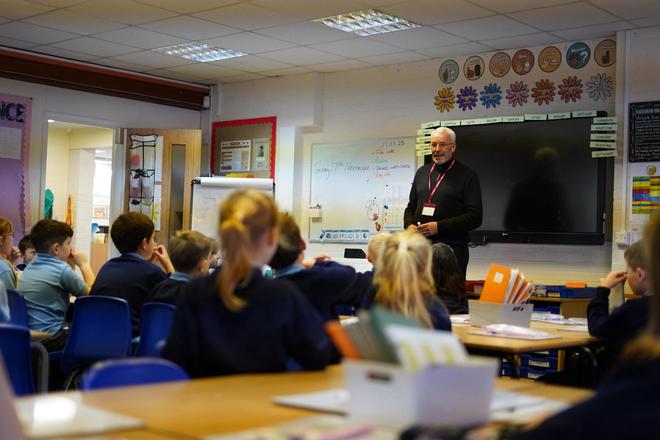English - Reading
|
|
|
Intent
Phonics, Reading, and Spelling
At Hormead, we believe that all our children can become fluent readers and writers. We recognise that every child is unique and our provision for reading, writing and phonics ensures that all of our children receive the support they need to flourish. Our youngest Nursery children receive daily phonics teaching covering Phase 1, through the use of the Supersonic phonics programme. Through Reception and Year 1, we teach early reading through Little Wandle Letters and Sounds Revised, which is a systematic and synthetic phonics programme. We start teaching phonics from day 2 in Reception and follow the Little Wandle progression through to the end of Year 1, which ensures children build on their growing knowledge of the alphabetic code, mastering phonics to read and spell as they move through the school.
As a result, all of our children are equipped with the skills and resilience to tackle any unfamiliar words as they read. At Hormead, we recognise the importance of modelling the application of the alphabetic code through phonics both inside and outside of the phonics lesson, and into the wider curriculum. We have a strong focus on language development for our children because we know that speaking and listening are crucial skills for reading and writing in all subjects.
Comprehension
At Hormead, we value reading as a crucial life skill. By the time children leave us, they read confidently for meaning, they regularly enjoy reading for pleasure and they have the courage and aspiration to take on new challenges in their reading. Our readers are equipped with the tools to tackle unfamiliar vocabulary and to ask questions to find things out. They understand how what they read links to their wider life experiences and how it can help them in so many different ways. We encourage our children to see themselves as readers for pleasure and purpose.
We believe that teaching every child to read is so important. Our English Lead is highly skilled at teaching phonics and reading, and they monitor and support our reading team, so that everyone teaches with fidelity. We recognise the gap in attainment in Literacy for children in receipt of FSM, versus those who are not, and our English Lead works closely with class teachers to ensure suitable provision is in place to ensure positive outcomes for all of our children.
Implementation
Foundations for Phonics in Nursery
We provide a balance of child-led and adult-led experiences for all children that meet the curriculum expectations for EYFS.
These include:
- sharing high-quality stories and poems
- learning a range of nursery rhymes and action rhymes
- activities that develop focused listening and attention, including oral blending
- attention to high-quality language.
We ensure Nursery children are well prepared to begin learning grapheme-phoneme correspondences (GPCs) and blending in Reception through the direct teaching of Phase 1 phonics, covering skills such as sound discrimination, alliteration and oral blending and segmenting.
Daily phonics lessons in Reception and Year 1
We teach phonics for 30 minutes a day. In Reception we build from 10-minute lessons, with additional daily oral blending games, to the full-length lesson as quickly as possible. These lessons always provide opportunities to revisit and review previous learning, in addition to the opportunities to learn, practice and apply new sounds and spelling patterns. Each Friday, we review the week's teaching to help children become fluent readers. Children make a strong start in Reception: teaching begins from day 2 of the Autumn term.
- We follow the Little Wandle letters and Sounds expectations of progress:
- Children in Reception are taught to read and spell words using Phase 2 and 3 GPCs, and words with adjacent consonants (Phase 4) with fluency and accuracy.
- Children in Year 1 review Phase 3 and 4 and are taught to read and spell words using Phase 5 GPCs with fluency and accuracy.
Daily keep-up lessons ensure every child learns to read
- Any child who needs additional practice has daily Keep-up support, taught by a fully trained adult. Keep-up lessons match the structure of class teaching, and use the same procedures, resources and mantras, but in smaller steps with more repetition, so that every child secures their learning.
- We timetable daily phonics lessons for any child in Year 2 or 3 who is not fully fluent at reading or has not passed the Phonics Screening Check. These children urgently need to catch up, so the gap between themselves and their peers does not widen. We use the Little Wandles Letters and Sounds Revised assessments to identify the gaps in their phonic knowledge and teach to these using the Keep-up resources - at pace.
- If any child in Year 3 or 4 has gaps in their phonic knowledge when reading or writing, we plan phonics 'catch-up' lessons to address specific reading/writing gaps. These short, sharp lessons last 10 minutes and take place at least three times a week.
Teaching reading: Reading practice sessions three times a week
We teach children to read through reading practice sessions three times a week.
These are taught by a fully trained adult to small groups of approximately six children . We use books matched to the children's secure phonic knowledge. All sessions are monitored by the class teacher, who rotates and works with each group on a regular basis.
Each reading practice session has a clear focus, so that the demands of the sessions do not overload the children's working memory. The reading practice sessions have been designed to focus on three key reading skills:
- decoding: teaching children to segment, blend and recognise tricky words.
- prosody: teaching children to read with understanding and expression
- comprehension: teaching children to understand the text.
In Reception these sessions start at approximately mid-October. Children who are not yet decoding have daily additional blending practice in small groups, so that they quickly learn to blend and can begin to read books. - In Year 2 and 3, we continue to teach reading in this way for any children who still need to practise reading with decodable books.
- Children in Year 4 also receive dedicated 'guided reading' sessions as a class to further develop their reading and comprehension skills, whilst gaining continued independence in reading.
Home Reading
A decodable reading practice book is taken home to ensure success is shared with the family. Reading for pleasure books also go home for parents to share and read with their children, starting from Nursery onwards. We share resources with our families about phonics, the benefits of sharing books, how children learn to blend and other aspects of our provision, both online and through workshops run by our English lead. We also invite our parents to join us regularly for 'Stay and Read' and 'Stay and Phonics' sessions, to observe the teaching of reading and phonics in action and ask any questions they may have.
Additional reading support or vulnerable children
- Children in Reception, year 1 and 2 who are receiving additional phonics Keep-up sessions read their reading practice book to an adult daily.
Ensuring consistency and pace of progress
- Every teacher in our school has been trained to teach reading, so we have the same expectations of progress. We all use the same language, routines and resources to teach children to read so that we lower children's cognitive load.
- Weekly content grids map each element of new learning to each day, week and term for the duration of the programme.
- Lesson templates, Prompt cards and How to videos ensure teachers all have a consistent approach and structure for each lesson.
Ensure reading for pleasure
We value reading for pleasure highly and work hard as a school to grow our Reading for Pleasure pedagogy.
- We read with children every day. We choose books carefully as we want children to experience a wide range of books, including books that reflect the children at Hormead School and our local community as well as books that open windows into other worlds and cultures.
- All of our writing units in Literacy use a high-quality text as their focus.
- Every classroom dedicates time for reading for pleasure, including individual free reading time, time in book corners and the library, and shared story time as a class or within a group.
- In Nursery and Reception, children have access to their reading corner every day in their free flow time and the books are continually refreshed, linking to different areas of learning as well as the children's observed interests and curiosities.
- Children from Reception onwards have a home reading record. The parent/carer records comments to share with adults in school and the adults will write in this on a regular basis to ensure communication between home and school.
- As the children progress through the school, they are encouraged to write their own comments and keep a list of the books/authors that they have read.
- The school library is made available for classes to use at protected times. Children across the school have regular opportunities to engage with a wide range of Reading for Pleasure events (book fairs, whole school book engage units, author visits and workshops, national events etc).
Impact
Assessment
Assessment is used to monitor progress and to identify any child needing additional support as soon as they need it.
Assessment for learning is used:
- daily within class to identify children needing Keep-up support
- weekly in the Review lesson to assess gaps, address these immediately and secure fluency of GPCs, words and spellings.
Summative assessment is used:
- every six weeks in Reception and Year 1 to assess progress, to identify gaps in learning that need to be addressed, to identify any children needing additional support and to plan the Keep-up support that they need.
- through half-termly Little Wandle Letters and Sounds Revised summative assessments where appropriate for Years 2 - 4, as well as through the teacher's ongoing formative assessment.
- by SLT and scrutinised through the Little Wandle Letters and Sounds Revised assessment tracker, to narrow attainment gaps between different groups of children and so that any additional support for teachers can be put into place.
- statutory assessment: children in year 1 sit the Phonics Screening Check. Any child not passing the check re-sits in year 2.
Expectations
Our school exceeds national average expectations for reading and phonics, due to the consistent, strong phonics teaching and reading provision that we provide here at Hormead.


